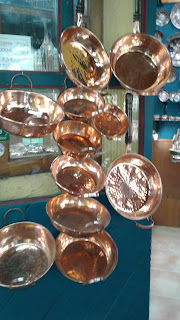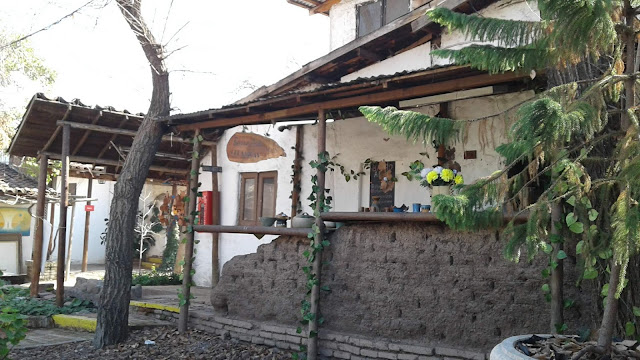Bright-eyed baby Phoebe (gua-gua, pronounced wha wha= baby in Chile, "bus" in DR. Do the two make the same sounds?) sleeps through the night at 2 1/2 months. I hope that means her parents do also?
After a mostly sleepless night, for once I was grateful to be awoken by banging and yelling at the construction site across the street, the rolling of suitcases and doors slamming in the hall, and the rolling out of garbage bins outside, a few feet from my bed: I was happy to find that my swallowing a clothespin was just a dream, as I had never had such a dilemma before! Of course I was not able to go back to sleep, so I started writing this random and useless trivia.
I made some delicious carrot, potato, onion. etc. soup, with what I thought was white cubes of chicken. It's not chicken...what is it?? ...some kind of innards like stomach? ...and I threw away the package, so I'm removing the unknown ingredient.. I can't eat it!
Chilean women are generally well dressed, have perfect eyebrows and make-up, and perfect lashes (the latter's secret is that they are curled around the eating part of a teaspoon). I have seen this often!
Sexual harassment or piropos is a big problem. Better to have a boyfriend (pololo) or fiance (novio) or husband (esposo/marido) for protection, though even that may not discourage unwanted aggression. Chile was the last in South American to legalize divorce, in this 70% self-proclaimed Catholic country.
Chile has 18,000,000 people, the same population California had in my youth. And according to the man I talked to last night, the only good ones are the Germans who were encouraged by a government program from 1852-1880, to come to Chile mostly to the south (Lake district). The Spanish are muy malos! Oh dear! Sounds just a little prejudiced!
Scarlet Oliva is one of my favorite young Chileans. She is a temple worker and one of the full-time teachers in the mission training center! She's completed the Pathways English program. The English modules I teach are pre-requisite training to apply for Pathways, which, when completed, gives students eligibility to take on-line courses through BYU Idaho. Many young people learn English and know it is key for careers and better jobs.
 |
 |
| One of my prize possessions is my bip card, which is needed for the excellent bus and metro system. One ride (almost anywhere in Santiago with transfers) is about $1/ US. There are stations to recharge. |
Copper, zinc, nitrates, precious and semi-precious stones, and jewelry as well as indigenous crafts such as Mapuche drums, wood carvings, other musical instruments, woven and knit textiles and clothing are important products.

Along Chile's coast and in the central valley (just like in California) are fabulous farms, vineyards which grow food exported all over the world. There are also cattle ranches. Originally the conquistadors came to get rich, but when gold became only an illusion, the Spanish crown offered them wealth in the form of encomiendas, where power over large areas of land and its indigenous inhabitants were entrusted to Spanish settlers. The Catholic church also hoped to convert them. When 90% of the indigenous died off from smallpox and other diseases, there was no one to pay tribute, so the encomienda system changed to large rural estates called haciendas. That didn't work either as there was no labor force.
Is this so different from California's Franciscan missions?
Santiago, Concepcion, Valparaiso, La Serena and other cities were founded by Pedro de Valdivia. Below is "Los Dominicos,"a large estate in Santiago, given to Ines de Suarez in the 1550's, and sold to many subsequent owners. The out-buildings now house beautiful workshops for local craftsmen. The church (with figure playing a trumpet!) and convent are very true to the original.
 |
| Welcome home, Nicholas Welch, to Palo Alto, CA., from 2 years of great service, mostly to international college students, as a full time missionary in Toronto, Canada. He begins studies at Stanford University next month. His brother Jameson has recently started his mission in Cambridge, England. |
This month Chile became the 14th Latin American country to ban smoking in enclosed public spaces. Chile’s conversion is significant, since it is something of a smokers’ corner. The World Health Organisation says over 40% of Chileans smoke, compared with 27% of Argentines and 17% of people in Brazil, where curbs on smoking began in the late 1990s.
The Church of Jesus Christ of Latter Day Saints in Chile:
Early apostle Parley P. Pratt was among the first Mormon missionaries to preach in Chile, landing in Valparaiso in November, 1851, along with Elder Rufus Allen and Phoebe Sopher, The mission party was impressed by the Chilean countryside and people. Pratt wrote that the people he met in Chile were "a neat, plain, loving and sociable people; very friendly, frank, and easy to become acquainted with," but the mission trip met with tragedy when the Pratt's month-old son died in January 1852. One difficulty was that, at the time of Pratt's visit, the Chilean constitution did not permit the practice of any religion besides Catholicism. The first baptisms were not performed in Chile until November 25, 1956, This was a very special occasion. These members would be the pioneers of the Church in Chile and it is believed that every one of them remained faithful until death: the Garcías, the Saldaños, and Sister Lanzarotti.
Since then the church here has grown to about 600,000 members with 10 missions. The second temple will be dedicated this October in Concepcion.
 |
| The Madrid mission training center has trained young missionaries since 1999, in Spanish, French, Portuguese, Italian, Russian, and English. The Santiago Chile MTC (below) has been open since 1981 to train in Spanish those who will serve in Chile. Missionaries will be sent to other locations starting in January when these two close. I have lived in both buildings (as well as in DR) as a senior missionary serving in those temples, and am sad about these closures where I have loved the closeness I've had with the young missionaries and the spirit there. It has not been announced what the MTC parts of the buildings will be used for. |

Outside our local Lider Express (a Walmart grocery) are many other vendors (produce, food, housewares, music, handcrafts)
 |
| Saturday morning was some kind of promotion. Prices are comparable to US on many items, cheaper for local produce, and very high for imported food products. I usually do self-service. |


I saw a shopping cart full of huge stuffed animals, and later in the temple a young friend worker who bought one there for his "novia."
Outside is a recycling center, so I carry my recyclables down there regularly. There are many centers around town.
It has been a good week, though devoid of excursions or exhibits. No big events, but a series of daily delights and miracles. Last night I was excited to see a couple, the Cobos, I had known in the Guayaquil Temple, who rushed over to hug me. They have moved to Chile with their 4 children. Next I talked to a young missionary who leaves in a few days to serve in the DR, and a Haitian who had also served in the DR. As missionaries we develop a connection and a closeness to others with the same ideals and beliefs, and shared experiences. And I know these "meetings" are not random, but help bring God's children together. I love my students, my fellow missionaries, young and older, and temple workers and patrons. We feel like family. Of course I love you, too, all spread far and wide across the world.
After Christ's death his disciples worked hard to accept and to teach that we are all part of the human family, no one is to be excluded, all are equally valued by Him. (Ephesians 2:19: ...ye are no more strangers and foreigners, but fellow citizens with the saints, and (all) of the household of God.)













It looks like your produce weighing system is the same as in Russia! I love your tongue-twister. We are sad that teaching English is not allowed for us in Russia. You have to be a licensed teacher. We have a young sister in our ward here who just got her mission call, and she will go to England MTC. The Russians used to all go to Spain.
ReplyDeleteSuper interesting post, Mom! Thanks for sharing this and zing experience with us!
ReplyDeleteI love that photo with the trumpet player - feels familiar.... Haha ... I agree! I love running into Fellow Missionaries, of all ages! I wish the recycling here in Ecuador was as good as in Chile unless you have any tips for me here? Who's baby is that? Your latest grandchild? Love and hugs to you!!!
ReplyDelete